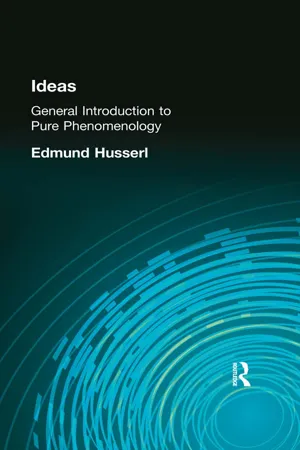
This is a test
- 464 pages
- English
- ePUB (mobile friendly)
- Available on iOS & Android
eBook - ePub
Book details
Book preview
Table of contents
Citations
About This Book
This is Volume X of twenty-two in a collection of works on 20th Century Philosophy in the Library of Philosophy which was designed as a contribution to the History of Modern Philosophy under the heads: first of Different Schools of Thought-Sensationalist, Realist, Idealist, Intuitivist; secondly of different Subjects-Psychology, Ethics, Political Philosophy, Theology. Originally published in 1932, this volume offers a general introduction to pure phenomenology.
Frequently asked questions
At the moment all of our mobile-responsive ePub books are available to download via the app. Most of our PDFs are also available to download and we're working on making the final remaining ones downloadable now. Learn more here.
Both plans give you full access to the library and all of Perlego’s features. The only differences are the price and subscription period: With the annual plan you’ll save around 30% compared to 12 months on the monthly plan.
We are an online textbook subscription service, where you can get access to an entire online library for less than the price of a single book per month. With over 1 million books across 1000+ topics, we’ve got you covered! Learn more here.
Look out for the read-aloud symbol on your next book to see if you can listen to it. The read-aloud tool reads text aloud for you, highlighting the text as it is being read. You can pause it, speed it up and slow it down. Learn more here.
Yes, you can access Ideas by Edmund Husserl in PDF and/or ePUB format, as well as other popular books in Philosophy & Philosophy History & Theory. We have over one million books available in our catalogue for you to explore.
Information
ANALYTICAL INDEX
(Modelled on the corresponding Index in the original German, as compiled by DR. LUDWIG LANDGREBE of Freiburg-im-Breisgau, 1928, on the basis of Dr. Gerda Walther’s Ausführliches. Sachregister, 1933.)
[TR. NOTE.—The references in this Index are to the Subsections, not, as in the original, to the pages. The letters a, b, c refer to the first, second, and final third of the subsections respectively. Ab refers to the area where a and b connect; bc to the connecting area between b and c. Where there is no mention either of a, b, or c, the reference is to the section as a whole. Dr. Landgrebe’s headings and references have been faithfully followed in the order given, except where the requirements of the English version necessitated some omission, addition, or deviation. Explanatory comments appear where needed within square brackets. Every reference in Dr. Landgrebe’s Index has been tested, and the slips, very few, thereby avoided, though there may of course be fresh ones in the English version, for which Dr. Landgrebe is not responsible. The more important references—as so judged by Dr. Landgrebe—have their section number, in the English as in the German version, cast in heavier type.]
A
Absolute, logical A. (primordial object) 15 b; A. of immediate perception 44 b, 46 a, 49 c; A. of the divine Being 58 c; transcendental A. not the final one 81 b.
Abstraction, A. and Ideation 22 b; A. and phenomenological reduction 51 a, b.
Abstraction, abstract, A. as dependent essence 15 b; a. and concrete 15 c; a. and concrete genera and sciences 72 a.
Absurdity; (i) Absurdität. Phenomenology of A. 145 a.
(ii) Widersinn. Concept of A. 52 a (ftn.).
Act (Akt)—(v.also ‘Experience ii’ and ‘cogito’)—Primordial A. (v. ‘Primordiality’) —thetic, positional, etc. A. (v. ‘Thesis’, etc.), A.-character (v. also ‘thetic character’ under ‘Thesis’).
A. as focal (wakeful) consciousness 35 c; the concept of A. in the Logical Studies 36 a, 84 c; A. and glancing towards 37 a; immanently and transcendently directed A. 38 b; A. and Pure Ego 80; fulfilled A. (attitudes) and unfulfilled (that have missed fulfilment or else Impulses to act) 84 b, 115 b; A. proper identified with fulfilled A. 84 c; the fulfilling of an A. (wakeful attitude) presupposes attention 92 b; every A.-character a thesis in wider sense 114 b, 117 a; A.-shadow 114 a; A. proper as explicit intentionality 115 a; only through A. in the narrower sense are the effects of conscious activity perceivable 115 b; the essential community of all A.-characters 117 a; every A. harbours a logical element; all A. objectifying acts 117 c; A. of higher order as polythetic 118 b; transformation of polythetic into monothetic A. 119; modalities of A.-fulfilment 122; expressibility of all A. 124 a; perceiving and non-perceiving A. 136 a.
Secondary or grounded (fundierte) A.—[complex A., A. based or founded on others. The ‘fundierende’ A. is the primary A. that ‘underlies’ the secondary, the latter being ‘consolidated’ through it and with it.] (V. also ‘Synthesis’,) —Twofold intentionality of secondary A. 37 c; noesis and noema of secondary A. 93 a, 116, 117, 118 b, c; transferability of all non-doxic into doxic A. 121 c.
Actuality. Focal A (Aktualität). Marginal or Nascent A. (Inaktualität); wakeful or focal (aktuell), dormant or marginal (inaktuell) (v. also ‘Glance’ and cogito).
F. A. fundamental form of the wakeful life 28 a; wakeful and d...
Table of contents
- Cover Page
- Half Title page
- Series Page
- Title Page
- Copyright Page
- Muirhead Library of Philosophy
- Original Title Page
- Original Copyright Page
- Author's Preface to the English Edition
- Translator's Preface
- Contents
- Introduction
- First Section The Nature and Knowledge of Essential Being
- Second Section The Fundamental Phenomenological Outlook
- Third Section Procedure of Pure Phenomenology in Respect of Methods and Problems
- Fourth Section Reason and Reality (Wirklichkeit)
- Analytical Index
- Index to Proper Names